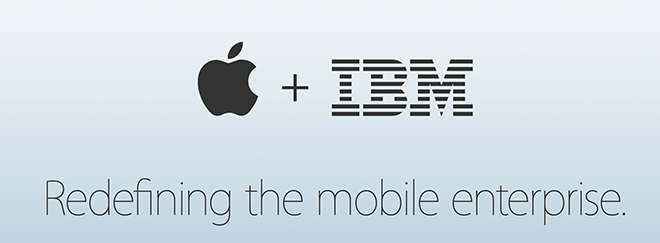When Apple and IBM announced plans to codevelop new iOS apps and jointly sell and support iPhones and iPad to enterprise customers, the news was greeted as if it were a new experiment. However, the deal is actually an extension of IBM's mobile strategy that has included massive deployments of iOS devices and native apps.
In a 2012 presentation on the company's "mobile transformation," IBM described its global organization as involving more than 425,000 employees and detailed that it managed 500,000 PCs, most of which were Lenovo (formerly IBM) PCs running Windows.
The company also detailed 100,000 "corporate liable" mobile phones (including 30,000 BlackBerry devices and 29,000 other smartphones and tablets) in addition to 50,000 employees who were reimbursed for their personal wireless expenses.
IBM's mobile push
At the time, IBM described an internal project (MESA) aimed at creating a "framework of reusable web-services that can be leveraged by mobile applications," and detailed over 40 internal IBM web apps targeting at mobile devices. The company also made prominent mention of Android, and detailed mobile device requirements that restricted some corporate data to BlackBerry devices.
However, last November IBM acquired Fiberlink, obtaining its MaaS360 cloud-based Mobile Device Management service and integrating into its product portfolio.
IBM isn't just selling MaaS360 as an alternative to other MDM offerings (including Good Technology, Microsoft's Enterprise Mobile Suite and BlackBerry Enterprise Server); it also began aggressively deploying the product internally, starting with IBM's CIO Office.
In March, IBM issued a white paper outlining that its "CIO Office manages about one hundred-thousand IBM employees' smartphones and tablets," and had initiated plans to migrate 90 percent of these devices to MaaS360 "within one month."
Bill Tworek, IBM's executive IT architect for CIO Office, noted that his group began "on-boarding devices on MaaS360 five days after the close of acquisition— 15,000 on the first day and over 30,000 in the first week," adding that "it took us less than 3 days to integrate MaaS360 into the IBM architecture and by moving from an on-premises model to a cloud model we'll save US $500,000."
Given that the majority of mobile device at IBM had been BlackBerry phones, that suggests a rapid migration from BES, an "on-premises" MDM that is not inexpensive to license and operate. That also underscores why BlackBerry's stock took such a hit when IBM and Apple announced their partnership.
Enterprise apps going native with iOS
However, there are two other platform shifts IBM's rapid migration and "MobileFirst" strategy highlight. First is that IBM is no longer targeting web apps as the way to approach mobile development.
Echoing the observations of FaceBook's chief executive Mark Zuckerberg, who in late 2012 stated that "the biggest mistake we made as a company was betting too much on HTML5 instead of native [platform development]," IBM's new partnership with Apple focuses on native apps.
"Right now, engineers, designers, and developers from both organizations are working on more than 100 end-to-end mobile solutions, including a new category of mobile apps, that are ready for the enterprise," the company states. "Each will address a specific industry need and is being designed from the ground up with cloud software services for analytics, data security, and device management native to iOS."
Building native apps for iOS that are designed to sell iPhone and iPad as part of a compete, managed solution is a primary blow to BlackBerry's enterprise-centric strategy aimed at resuscitating its sales. But it's also a blow to Android, which lacks critical enterprise support in software and introduces hardware fragmentation issues.
It's also more bad news for Microsoft's struggling Windows Phone, which is currently selling primarily to low end consumer markets. Additionally, it's also a bad for Windows PCs, hybrid devices and tablets that are struggling to fend off sales erosion due to the increasing adoption of iPads among mobile workers.
New push in Enterprise adoption of Macs
Outside of iOS, there's also another significant new benefactor to IBM's partnership with Apple: Mac sales. That's because native iOS app development requires Apple's Xcode, which remains exclusive to OS X.
Roman Foeckl, the chief executive of CoSoSys, an enterprise security firm that sells PC security and Mobile Device Management tools, noted in an email that "Apple has learned a lot from its huge deployment of iOS devices in the enterprise. With iOS devices gaining popularity amongst traditionally Windows agnostic users, the tide has started to shift dramatically." "with IBM's added expertise about enterprise needs, we could finally start to see a significant shift in the balance over control of the enterprise IT" - Roman Foeckl, CEO CoSoSys
Foeckl added, "This trend is confirmed by yesterday's Apple quarterly announcement of a 17.6% increase in Mac sales (Q3 2013 vs. Q3 2014) with a total of 4.41m Macs sold. Many of them are being sold to enterprise customers and the partnership announcement with IBM will continue fueling this trend. IBM knows the enterprise needs.
"The IBM - Apple partnership announced last week was seen as unexpected, but in reality IBM has been one of the biggest users of iOS and Mac products for several years now. What was surprising, however, is that this announcement happened the same week as the news that Microsoft was reducing their workforce by 18,000 (even though mainly effecting Nokia).
"Apple products have been gaining serious market share in the enterprise over the past few years, and now with IBM's added expertise about enterprise needs, we could finally start to see a significant shift in the balance over control of the enterprise IT."
 Daniel Eran Dilger
Daniel Eran Dilger






-m.jpg)






 Charles Martin
Charles Martin


 Wesley Hilliard
Wesley Hilliard
 Stephen Silver
Stephen Silver
 William Gallagher
William Gallagher

 Marko Zivkovic
Marko Zivkovic








40 Comments
Encircle, then suffocate. Isolate, then overwhelm. Isolate, suffocate, eradicate. I'm running out of catch phrases. Up until now, I've always thought that Windows will always remain a fixture in enterprise computing no matter how successful iOS is. But IBM and Apple in partnership, they probably have enough pieces to offer a migration path for erstwhile Windows shops. It won't happen overnight but consider the possibilities. Would be quite karmic, the two companies that Gates sort of treacherously pulled the rug from under come back 30 years later to bury Microsoft. It's so Shakespearean. Or Sophoclean.
It will be AWESOME when Apple takes over IBM and FORCES people to use OSX at work. FREEDOM, becuase AMERICA
It will be AWESOME when Apple takes over IBM and FORCES people to use OSX at work.
FREEDOM, becuase AMERICA
At least we'll have a choice between OS X and Windows at work. OS X is nicer to stare at during the day. :D
The MaasS360 website already touts increased security and control with iOS7 using their cloud MDM.
My takeaway from this article is that HTML5 isn't as efficient as expected, and a "closed wall" solution (iOS) is more optimal, even if you throw all your eggs in one basket.
Maybe this will drive a Mac mini update